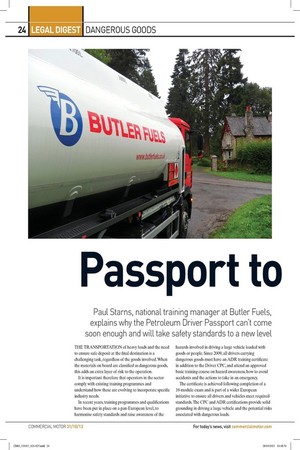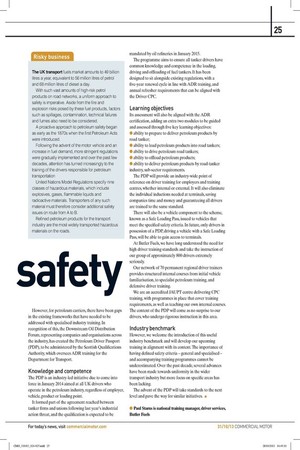Passport to
Page 19

Page 20

If you've noticed an error in this article please click here to report it so we can fix it.
safety
Paul Starns, national training manager at Butler Fuels, explains why the Petroleum Driver Passport can't come soon enough and will take safety standards to a new level
THE TRANSPORTATION of heavy loads and the need to ensure safe deposit at the final destination is a challenging task, regardless of the goods involved. When the materials on board are classified as dangerous goods, this adds an extra layer of risk to the operation.
It is important therefore that operators in the sector comply with existing training programmes and understand how these are evolving to incorporate specific industry needs. In recent years, training programmes and qualifications have been put in place on a pan-European level, to harmonise safety standards and raise awareness of the
hazards involved in driving a large vehicle loaded with goods or people. Since 2009, all drivers carrying dangerous goods must have an ADR training certificate in addition to the Driver CPC, and attend an approved basic training course on hazard awareness, how to avoid accidents and the actions to take in an emergency.
The certificate is achieved following completion of a 10-module exam and is part of a wider European initiative to ensure all drivers and vehicles meet required standards. The CPC and ADR certifications provide solid grounding in driving a large vehicle and the potential risks associated with dangerous loads.
However, for petroleum carriers, there have been gaps in the existing frameworks that have needed to be addressed with specialised industry training. In recognition of this, the Downstream Oil Distribution Forum, representing companies and organisations across the industry, has created the Petroleum Driver Passport (PDP), to be administered by the Scottish Qualifications Authority, which oversees ADR training for the Department for Transport.
Knowledge and competence
The PDP is an industry-led initiative due to come into force in January 2014 aimed at all UK drivers who operate in the petroleum industry, regardless of employer, vehicle, product or loading point. It formed part of the agreement reached between tanker firms and unions following last year's industrial action threat, and the qualification is expected to be
mandated by oil refineries in January 2015.
The programme aims to ensure all tanker drivers have common knowledge and competence in the loading, driving and offloading of fuel tankers. It has been designed to sit alongside existing regulations, with a five-year renewal cycle in line with ADR training, and annual refresher requirements that can be aligned with the Driver CPC.
Learning objectives
Its assessment will also be aligned with the ADR certification, adding an extra two modules to be guided and assessed through five key learning objectives: • ability to prepare to deliver petroleum products by road tanker; • ability to load petroleum products into road tankers; • ability to drive petroleum road tankers; • ability to offload petroleum products;
• ability to deliver petroleum products by road-tanker industry, sub-sector requirements.
The PDP will provide an industry-wide point of reference on driver training for employers and training centres, whether internal or external. It will also eliminate the individual inductions needed at terminals, saving companies time and money and guaranteeing all drivers are trained to the same standard.
There will also be a vehicle component to the scheme, known as a Safe Loading Pass, issued to vehicles that meet the specified safety criteria. In future, only drivers in possession of a PDP, driving a vehicle with a Safe Loading Pass, will be able to gain access to terminals.
At Butler Fuels, we have long understood the need for high driver training standards and take the instruction of our group of approximately 800 drivers extremely seriously.
Our network of 70 permanent regional driver trainers provides structured internal courses from initial vehicle familiarisation, to specialist petroleum training, and defensive driver training.
We are an accredited JAUPT centre delivering CPC training, with programmes in place that cover training requirements, as well as teaching our own internal courses. The content of the PDP will come as no surprise to our drivers, who undergo rigorous instruction in this area.
Industry benchmark
However, we welcome the introduction of this useful industry benchmark and will develop our upcoming training in alignment with its content. The importance of having defined safety criteria — general and specialised — and accompanying training programmes cannot be underestimated. Over the past decade, several advances have been made towards uniformity in the wider transport industry but more focus on specific areas has been lacking. The advent of the PDP will take standards to the next level and pave the way for similar initiatives. • • Paul Stams is national training manager, driver services, Butler Fuels









































